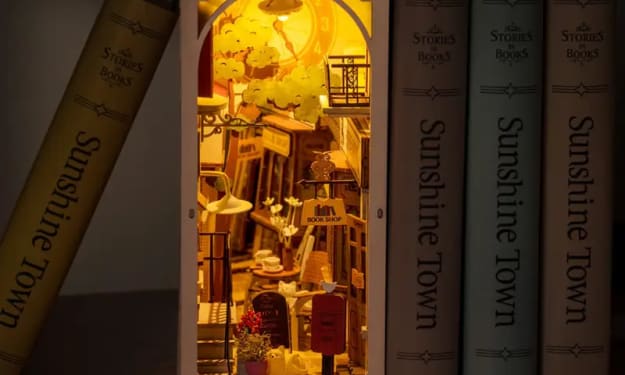
Introduction
The books we read as teenagers for class were never our favorite books. They were just different. Full of complex themes and ideas that adults made us read for…reasons. They were a means to an end, things that you needed to study and memorize for tests and exams, rather than things to be simply enjoyed. For what seemed like the longest time, enjoyment meant escaping from these books as fast as possible.
That is, until one book became the escape. A book that was not a cage, but a key that unlocked them.
For me, that book was John Fowles's The French Lieutenant’s Woman.
In Search of Lost Time
The first thing I did for this challenge was go to my bookshelf and pull out my copy of the novel. The first thing I noticed was how much the cover, and the pages within it, had yellowed since the last time I read it. I glimpsed the familiar drawing of a foam-crested wave breaking on the cover, and noticed, for the first time, that the wave is not simply breaking, as I had always assumed, but actually breaking against something: a brick wall, the famous Cobb of Lyme Regis. The style of the wave on the cover has always reminded me of The Great Wave off Kanagawa, that famous woodblock print created by the Japanese artist Hokusai in 1831 depicting a wave threatening to engulf boats and even Mount Fuji. But while the swell in Hokusai’s print is travelling east, the wave breaking against the Cobb comes from the west.
Having thoroughly judged the book by its cover, I opened it and tenderly flicked through its warm, creamy pages. I read the spidery scrawl, remnants of my lead pacer, as it scuttles across the margins, and marveled at the parentheses and parabolas I had drawn across key passages in an effort to span the frustratingly vast gulf between their meaning and my understanding. It suddenly dawned on me that it had been a decade since I first read the novel, during my final year of high school. Interacting with a novel I had read and made notes in a decade ago was such a profound experience. It felt like I was interacting with my past self. Hardly an original thought, I know, but one I’d never had cause to reckon with before that moment.
A Short Introduction to The French Lieutenant’s Woman
So, how did The French Lieutenant’s Woman change me?
Before I answer that question, it’s probably worth briefly explaining what the novel is actually about. Set in 1860s England, at the height of the Victorian era, the novel begins with the protagonist, Charles Smithson, and his fiancée, Ernestina, promenading by the sea in Lyme Regis, an English coastal town, where suddenly Charles spots a woman in black standing by the crashing waves, and staring into the distance. That woman is Sarah Woodruff, the French Lieutenant’s Woman, so named because she is rumored to have surrendered her virtue to a soldier, and a Frenchman at that. “I do not like the French,” exclaims one character in response to the “appalling disclosure” that Sarah speaks French, before telling her that “[she] will not have French books in [her] house.” Charles, far from being repulsed, as one might expect a gentleman of the Victorian era to be, is instead intrigued by the woman, regarding her more as “a figure of myth, than any proper fragment from any petty provincial day.” To Charles, Sarah not only transcends the town of Lyme Regis, but the entire Victorian Age. “Charles did not know it,” Fowles writes, “but in those brief poised seconds above the waiting sea, in that luminous evening silence broken only by the waves’ quiet wash, the whole Victorian Age was lost.” From that point forward, the destinies of the two are inexorably intertwined.
Aside from Charles, Sarah, and Ernestina, we are introduced to an almost Dickensian cast of characters: the Francophobe and puritanical paragon of petty provincialism, Mrs Poulteney, an upper class woman of Lyme Regis who takes Sarah into her employ for a brief time, until she learns of her sordid history; Mrs Fairley, the woman who runs the “Stygian domain” that is Mrs Poulteney’s household; a local vicar, the servants, Sam and Mary, an aunt, a doctor, and Ernestina’s father Mr Freeman, to name but a few.
Despite being set in the Victorian era, with typically Victorian characters, The French Lieutenant’s Woman is not a Victorian novel, but rather a Romantic one. It creates a world set in the Victorian era — a world where reason reigns supreme, where social convention is rigidly adhered to, and where individuals who fail to play by the rules, be they of fashion or of manners, are condemned and ostracized — in order to hold up a mirror to its failings.
So, how did The French Lieutenant’s Woman change me? Let me count the ways…
1. It showed me the merits of re-reading
Of all the difficult texts we had to grapple with in our English literature class — Greek tragedies, Shakespeare, Joseph Conrad’s Heart of Darkness, F Scott Fitzgerald’s The Great Gatsby (all white men, but I digress) — The French Lieutenant’s Woman was the most daunting. For starters, it was the longest of all the novels I have ever studied: weighing in at 470 pages, it dwarfed the other prescribed texts by a wide margin. The first time I read through the novel I found it to be extremely difficult. Its language, like chocolate mousse, was delicious, but very rich, and I was struggling to extract meaning from the text. As my final exams grew closer, I became increasingly anxious about my ability to write about the novel. One month before my final exam, I panicked and read the entire novel a second time, when I was shocked to feel what felt like a veil being lifted from my eyes, allowing me to see the novel in a new light. The French Lieutenant’s Woman, more than any other book I have read, is a monument to how much I was able to improve that year, and demonstrated the benefits of re-reading. I only wish that I had more time to do it...
2. Fowles’s thoughts on the relationship between a creator and their creations
I have already explained that The French Lieutenant’s Woman is not a typical Victorian novel. However, there is very little to indicate this for the first 12 chapters of the novel. I say very little because, as the story starts to unfold, Fowles slowly begins to slip anachronisms into his writing. Of Mrs Poulteney, Fowles writes that “[t]here would have been a place in the Gestapo for the lady”, referring to an institution that did not exist until approximately 70 years after the time the novel is set in. Similarly, at another point in the novel, he describes a realization hitting Charles “like an atom bomb.” These anachronisms are like little stones that skitter down the mountainside, portents of an avalanche that threatens to shatter the world Fowles has otherwise carefully created.
Once a reader reaches Chapter 13, we are hit by an avalanche, only to learn that its arrival was by design, as Fowles pauses the story to converse directly with the reader. Up to this point, we have viewed Fowles as an omniscient narrator. Chapter 13 is where he pulls back the curtain, writing “I do not know. This story I am telling is all imagination. These characters I create never existed outside my own mind. If I had pretended until now to know my characters’ minds and innermost thoughts, it is because I am writing in (just as I have assumed some of the vocabulary and ‘voice’ of) a convention universally accepted at the time of my story: that the novelist stands next to God. He may not know all, yet he tries to pretend that he does.”
But Fowles is just getting started. “Perhaps,” he suspects we are thinking, “you thought that a novelist has only to pull the right strings and his puppets will behave in a lifelike manner; and produce on request a thorough analysis of their motives and intentions.”
“But,” he confesses, “I find myself suddenly like a man in the sharp spring night, watching [Sarah] from the lawn beneath that dim upper window in Marlborough House.”
“But I am a novelist, not a man in a garden – I can follow her where I like?” Fowles imagines us asking, before offering the following retort: “[P]ossibility is not permissibility.”
Fowles then offers an explanation of why writers write: “Novelists write for countless different reasons, I could fill a book with reasons, and they would all be true, though not true of all. Only one same reason is shared by all of us: we wish to create worlds as real as, but other than, the world that is. Or was.”
But what does it take for a world to become real? According to Fowles, “[a] genuinely created world must be independent of its creator; a planned world (a world that fully reveals its planning) is a dead world. It is only when our characters and events begin to disobey us that they begin to live.”
To illustrate this point, Fowles writes that when Charles last left Sarah, he ordered him to walk straight back to Lyme Regis. “But he did not; he gratuitously turned and went down to the Dairy.” Fowles, acknowledging that such an idea borders on the pretentious (“Oh, but you say, come on,” he says, imagining his readers collectively rolling their eyes.), offers the following clarification: “what I really mean is that the idea crossed my mind as I wrote that it might be more clever to have him stop and drink milk…and meet Sarah again. That is certainly one explanation of what happened; but the idea seemed to come more clearly from Charles, than [Fowles].”
“It is not only that [Charles] has begun to gain an autonomy," Fowles adds. “I must respect it, and disrespect all my quasi-divine plans for him, if I wish him to be real. There is only one good definition of God: the freedom that allows other freedoms to exist. The novelist is still a god, since he creates; what has changed is that we are no longer the gods of the Victorian image, omniscient and decreeing; but in the new theological image, with freedom as our first principle, not authority.”
“I have disgracefully broken the illusion?” Fowles asks rhetorically. “No,” he answers emphatically. “My characters still exist in a reality no less, or no more, real than the one I have just broken. Fiction is woven into all, and we are all in flight from the real reality. I do not fully control these creatures of my mind.”
“This is preposterous?” Fowles asks, pre-empting another eye-roll, another accusation of pretentiousness being levelled against him. “Characters cannot be divided into real and imaginary, since even ‘real’ people do not even think of their own past as quite real,” but tend to fictionalize it instead.
To my seventeen year old self, Fowles’s musings on the autonomy of his creations seemed more than a little bit pretentious. How ridiculous? I thought to myself. Nothing can happen in a story unless an author wills it. Characters, plots and everything else that happens in a story can only happen by design. They key is merely to pretend that it hasn't.
It wasn’t until years later, writing fan fiction, when I often found that I was not creating dialogue for fictional characters so much as recording a conversation between two people, people who are as real as their world as I am in mine. This is possibly easier to comprehend in the case of fan fiction, since the characters one writes about already exist in a reality outside of the one we inhabit. But there’s no reason why the same can’t be true of our original stories, our original creations. After all, one person’s original creation is another person’s fan fiction sandbox. Either way, these are not created out of thin air, but exist in various forms, and in various states of completion, each waiting to be found and brought forth into the light, and onto the page.
3. No(n)sense of an ending
Another thing I didn’t know until I read The French Lieutenant’s Woman is that literary fiction could have multiple endings. In The French Lieutenant’s Woman, Fowles treats us to not one, but three endings. A god in the new theological image, with freedom as his first principle, Fowles gives us the right to choose how we think the story ends. However, there is one ending that I think it is safe to say is totally unconvincing, and which serves as a critique of what might be considered a conventional Victorian ending: with over one hundred pages to go, Fowles declares, totally unconvincingly, “[a]nd so ends the story”, before rattling off a list of meaningless births, deaths and marriages. “Charles and Ernestina begat what shall it be – let us say seven children,” he writes, plucking a number of thin air. Meanwhile, of Sam and Mary he writes “who can be bothered with the biography of servants? They married, and bred, and died, in the monotonous fashion of their kind.” The Victorian era was a classist society. It was not interested in the plight of the poor. The more things change…
4. It showed me how authors can figure in their own story
Just because a genuinely created world must be independent of its creator, does not mean its creator needs to be separate from it. The French Lieutenant’s Woman sees Fowles inserting himself, not merely by speaking to us in his capacity as the novelist, but by becoming a character in his creation. In Chapter 13 he finds himself “suddenly like a man in the sharp spring night, watching [Sarah] from the lawn beneath that dim upper window in Marlborough House.” In the final chapter he is no longer merely like a man in the story: he is one, and a fabulous one at that. Fowles sumptuously describes him(self) as “the extremely important-looking person…leaning against the parapet of [an] embankment. The once full, patriarchal beard has been trimmed down to something rather foppish and Frenchified. There is about the clothes, in the lavishly embroidered summer waistcoat, in the three rings on the fingers, the panatella in its amber holder, the malachite-headed cane, a distinct touch of the flashy. There is, in short, more than a touch of the successful impresario about him.”
Fowles’ self-insertion is not out of vanity, but necessity. His impresario is the one who enables the reader to choose between multiple endings, winding back his watch fifteen minutes to allow the third ending to play out differently from the second. Fowles describes him “tak[ing] out his watch – a Breguet – and select[ing] a small key from a vast number on a second gold chain. He makes a small adjustment to the time. It seems – thought unusual in an instrument from the bench of the greatest of watchmakers – that he was running a quarter of an hour fast.”
5. There’s someone else I’ve got to be…
Unlike the previous items on this list, which have largely dealt with matters of style, I will now return to matters of substance, in particular the themes of rejecting the labels other people, or society as a whole, try to impose on us, and of forging our own path. This is best exemplified by the French Lieutenant’s Woman herself, Sarah Woodruff, who spends the entire novel determined to defy classification. “What has kept me alive, she tells Charles, "is my shame, my knowing that I am truly not like other women." She later adds: “Sometimes I almost pity them. I think I have a freedom they cannot understand. No insult, no blame, can touch me. Because I have set myself beyond the pale. I am nothing. I am hardly human any more. I am the French Lieutenant’s Woman.”
“All I ask is to be allowed to understand,” Charles begs.
“But I am not to be understood,” Sarah replies. “[E]ven by myself. And I can’t tell you why, but I believe my happiness depends on my not understanding.”
Thus, one of the themes of The French Lieutenant’s Woman that really resonated with me is that, in not being understood, even by ourselves, we have the freedom to be whoever we want. Fowles describes this as “the anxiety of freedom – that is, the realization that one is free and the realization that to be free is a situation of terror.” On the one hand, on the cusp of finishing high school, I could, and still can, definitely relate to the anxiety of freedom, feeling like I didn’t understand who I was or what the world had in store for me. At the same time, as the example of Sarah demonstrates, not understanding can also be a source of happiness. It can also mean freedom from anxiety, and not understanding, or caring, about the limits the world may try to place on us. A ship in the harbour of Lyme Regis may be safe from the swell. However, ships are not destined to remain in the harbour, anchored comfortably behind the Cobb, but, echoing both Fowles and Matthew Arnold, to sail “out again, upon the unplumb’d salt, estranging sea.”





Comments (1)
great job Join my friends and read what I have just prepared for you I am sure you will like it